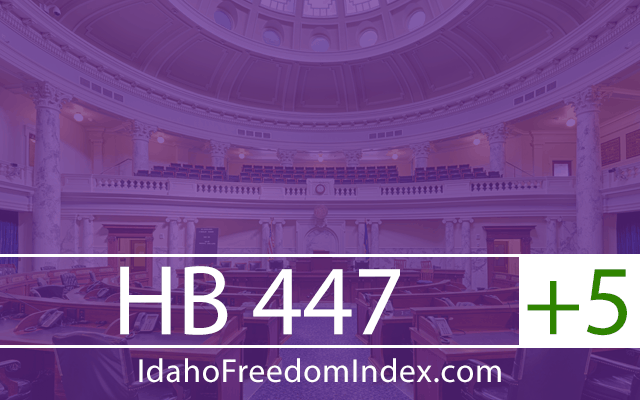


Bill description: HB 447 reforms the procedures for seizure of civil assets by law enforcement.
Rating: +5
Does it in any way restrict public access to information related to government activity or otherwise compromise government transparency or accountability? Conversely, does it increase public access to information related to government activity or increase government transparency or accountability?
HB 447 would increase government accountability by establishing reporting requirements for any agencies that seize assets via civil forfeiture. HB 447 would add a new subsection, I.C. § 37-2744 (j), which includes a list of information that is to become part of the public record in the Controller’s Office. This list includes “(1) Name of the law enforcement agency that seized the property; (2) Date of seizure; (3) Type and description of property seized, including make, model, year, and serial number, if applicable; (4) Crime, if any, for which the suspect was charged including whether such crime is a violation of state or federal law; (5) Criminal case number, if any; (6) Outcome, if any, of suspect’s case; (7) If forfeiture was not processed under state law, the reason for the federal transfer, if known; (8) Forfeiture case number; (9) Date of forfeiture decision; (10) Whether there was a forfeiture settlement agreement; (11) Date and outcome of property disposition as described by one (1) of the following: returned to owner, partially returned to owner, sold, destroyed, or retained by law enforcement; and (12) Value of the property forfeited based on the value realized, if sold, or a reasonable good faith estimate of the value, if possible.” These reporting requirements would keep law enforcement accountable by ensuring the public knows what is happening with in civil asset forfeiture cases.
(+1)
HB 447 also states the “mere presence or possession of United States currency, without other indicia of criminal activity, is insufficient probable cause for seizure” of an individual’s or an organization’s property (Page 2, Lines 48-49). This holds law enforcement agencies accountable to prove the currency was involved in, and not incidentally related to, a committed crime. The same standard would apply to all easily liquidated assets, such as bonds, stocks, or securities. They would have to be (1) “found in close proximity” and (2) “used or intended for use in connection with” the illegal activity, not just one or the other.
(+1)
Does it directly or indirectly create or increase any taxes, fees, or other assessments? Conversely, does it eliminate or reduce any taxes, fees, or other assessments?
Currently, if something seized through civil asset forfeiture by law enforcement was owned in part or whole by someone unrelated to the relevant crime, that person has the right to have his property returned. The court overseeing the case, however, may charge the individual with whatever costs were incurred by the law enforcement agency that made the seizure. For example, a court could charge a car dealership the costs to impound, tow and store a vehicle, which was leased to someone who used it in a crime, in order for possession to be returned to the car dealership. HB 447 rescinds a court’s authority to assess such fees (Page 5, Lines 17-19).
(+1)
Does it directly or indirectly create or increase penalties for victimless crimes or non-restorative penalties for non- violent crimes? Conversely, does it eliminate or decrease penalties for victimless crimes or non-restorative penalties for non-violent crimes?
HB 447 would also reduce the number of crimes for which assets can be seized. I.C. § 32-2744(a)(1) states: “All conveyances, including aircraft, vehicles, or vessels, which are used, or intended for use, to transport, or in any manner to facilitate the transportation, delivery, receipt, possession or concealment, for the purpose of distribution or receipt of” illegal substances would still be subject to forfeiture (Page 1, Lines 26-32). This bill would substitute manufacturing for “possession or concealment, for the purpose of distribution or receipt.” Agencies might argue over whether substances were intended for distribution. Evidence of manufacturing is not as easily misinterpreted. Surely, fewer individuals incorrectly identified as engaged in distribution of illegal substances would lose their assets.
(+1)
HB 477 allows individuals who need their property returned—such as a taxi driver who has lost his cab—to petition the court, with stipulations. The property owner would have to guarantee that the property will not be used for any criminal activity and leave security with the agency. Additionally, the property must not have evidentiary value. This language would buffer individuals from seizures by law enforcement agencies that could cost them their employment or in other ways significantly harm Idahoans.
(+1)

